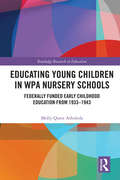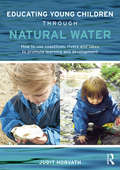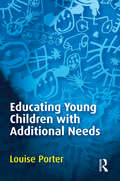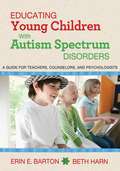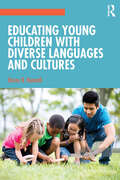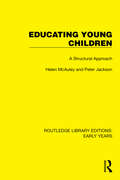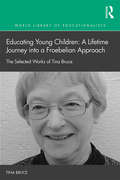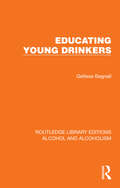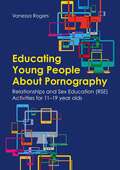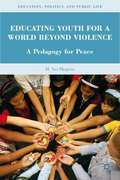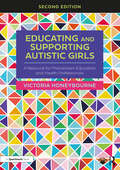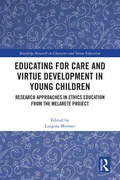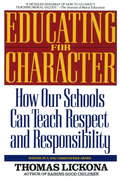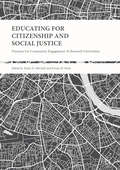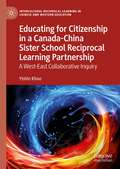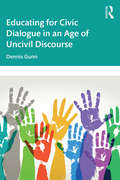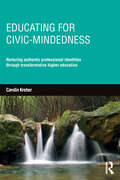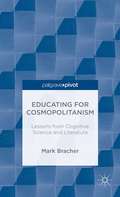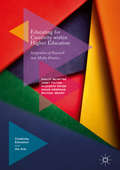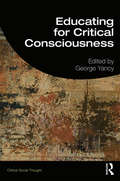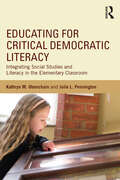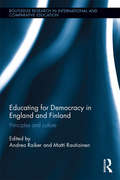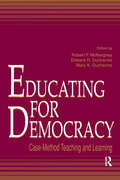- Table View
- List View
Educating Young Children in WPA Nursery Schools: Federally-Funded Early Childhood Education from 1933-1943 (Routledge Research in Education #31)
by Molly Quest ArboledaEducating Young Children in WPA Nursery Schools, the first full-length national study of the WPA nursery school program, helps to explain why universal preschool remains an elusive goal. This book argues that program success in operating nursery schools throughout the United States during the Great Depression was an important New Deal achievement. By highlighting the program’s strengths—its ideals, its curriculum, and its community outreach—the author offers a blueprint for creating a universal preschool program that benefits both children and their families. This volume uncovers the forgotten perspective of WPA nursery school leaders and highlights the program’s innovative curriculum for young children by incorporating both extensive archival research and neglected sources.
Educating Young Children through Natural Water: How to use coastlines, rivers and lakes to promote learning and development
by Judit HorvathCoastlines, rivers and natural waters have a huge amount to offer young children, providing a unique environment for their learning and development. The environment and its almost daunting size touches something deep within the children and – surprisingly – the large space brings them closer together. This book provides a comprehensive guide to Natural Water School provision by exploring its special pedagogy, the organisation and management of the Water School session and discussing the learning environment and its implications for children’s wellbeing and development. It clearly explains the key principles of this recently developed, contemporary approach and sets out a framework for setting up and leading a Natural Water School programme. The book shows how the aims and outcomes of early years education, including the Early Years Foundation Stage can all be achieved within the Natural Water School environment and is supported by examples and case studies throughout. Full of practical suggestions and activities, it includes: Activity ideas covering topics such as wildlife, sensory activities, crafts, social development, physical play and construction in different seasons Unique teaching tools to observe and develop the children Ideas for working with children of different ages and learning styles Detailed guidance on health and safety including risk assessments Offering a sound historical background, a solid pedagogical framework and a step-by-step guide to Natural Water School practice, this handy text will help students and practitioners to fully understand this new and increasingly popular approach to early years education and how it can benefit the children they care for.
Educating Young Children with Additional Needs
by Louise PorterIn scope and spread this book deserves to become a standard text for policy-makers, practitioners, those in training and their tutors. I welcome this book for its coverage of typical and a-typical development in young children and its emphasis upon an ethical and principled approach to working with young children and their families.Professor Sheila Wolfendale, Director of the Doctorate in Educational Psychology programme at the University of East London.Most young children with additional educational needs are enrolled in their local childcare centre or pre-school. Whether they have delayed or advanced skills, many will need extra support from teachers and child care workers so that they can participate fully in these settings.Educating Young Children with Additional Needs is a comprehensive guide to working with these children. It outlines how to recognise when young children have atypical needs, individualise relevant programs for them, and make sure that they can participate socially with other children in the group. It highlights the importance of teachers' and caregivers' responsiveness both to the children and their parents. Individual chapters explain how to identify and meet the additional needs of children with vision or hearing impairments and those with difficulties acquiring motor, daily living, communication or intellectual skills. The emphasis is on assisting those with mild to moderate difficulties in any of these domains. The particular needs of gifted children are also explored. Educating Young Children with Additional Needs is a valuable professional reference and student text for child care workers and pre-school teachers.
Educating Young Children with Autism Spectrum Disorders: A Guide for Teachers, Counselors, and Psychologists
by Beth Harn Erin E. BartonAccording to the CDC, one in fifty American children is diagnosed as having an autism spectrum disorder. This means more school-aged children are entering classrooms with ASDs and teachers are being called upon to help facilitate their learning. Educating Young Children with Autism Spectrum Disorders is aimed at providing strategies for teachers, school counselors, and psychologists to help address the needs of children on the spectrum, as well as their families. Erin E. Barton and Beth Harn draw on current research and practices to discuss the possible causes of autism and to help prepare educators not only for teaching children in the classroom but also for providing families with the tools necessary to continue the educational process at home. Included are topics such as: Improving communication and socializationDeveloping instructive lessonsAssessing students' progressIncluding families in educational goalsFinding students' special interests and using those to help facilitate learningManaging challenging behaviorAnd more Including forms, charts, and a range of classroom activities, this is the only resource you will need to gain the insight and tools for making a difference in the educational lives of young children with autism.
Educating Young Children with Diverse Languages and Cultures
by Karen N. NemethThis comprehensive textbook prepares early childhood educators to effectively work with and support young children (ages 0-8) with diverse languages, cultures, and learning needs. With a multipurpose, multilevel format, this dynamic resource focuses on the central role of language development and culture in all aspects of learning. Adaptable chapters cover curriculum, family involvement, co-teaching, classroom environment and more, and feature both brief and deeper study versions of the material, alongside a wealth of case examples and implementation strategies. Accompanied by an online instructor’s manual, this ground-breaking text is an ideal resource for students and educators in early childhood and second language education, and all fields that work with young children, and all fields that work with young children.
Educating Young Children: A Structural Approach (Routledge Library Editions: Early Years)
by Peter Jackson Helen McAuleyIn its discussion of the three levels of teaching and learning – whole school philosophy, classroom policy and specific teaching frameworks – Educating Young Children, originally published in 1992, addresses the twin themes of teacher ethics and pedagogic theory. In developing their argument the writers draw on both empirical classroom research and philosophical analysis, as well as the work developed within the Roehampton Institute MA programme in which they were both tutors at the time.
Educating Young Children: The Selected Works of Tina Bruce
by Tina BruceIn the World Library of Educationalists international experts compile career-long collections of what they judge to be their most significant pieces – excerpts from books, key articles, salient research findings, major theoretical and practical contributions – so the world can read them in a single, manageable volume. Readers will be able to follow the themes and strands and see how their work contributes to the development of the field. Educating Young Children: A Lifetime Journey into a Froebelian Approach draws together Professor Tina Bruce CBE’s most prominent writings from her accomplished 40-year international career in education centred on the Froebelian tradition. Chosen to illustrate the changes that have occurred in Professor Bruce’s thinking and practices over the last four decades, carefully selected readings address key Froebelian themes such as literacy, play, inclusion and creativity. Short introductions are provided for each chapter and excerpt, helping readers to understand the significance of what is presented and explaining how this relates to other chapters in the book. Including chapters from Tina Bruce’s best-selling books and articles, as well as leading journals, this collection offers a unique commentary on some of the most important issues in Early Childhood Education over the last four decades; it will be engaging and inspiring reading for anyone interested in the development and state of early years education in the UK and internationally.
Educating Young Drinkers (Routledge Library Editions: Alcohol and Alcoholism)
by Gellisse BagnallYoung people are regarded as vulnerable by the media – often exaggeratedly so. In the early 1990s they had become the focus of public concern regarding alcohol misuse. But attempts to educate teenagers into using alcohol sensibly have often been counterproductive. What kind of approach should alcohol education take to produce effective results? Originally published in 1991, Educating Young Drinkers outlines the reasons for the lack of success in previous experiments in alcohol education at the time. It focuses on an activity-based primary intervention with young people as a possible solution. With the active involvement of school teachers, Gellisse Bagnall had developed a relevant and pupil-oriented programme designed for easy classroom use. The evaluation of the results of this experiment demonstrated that non-didactic alcohol education can be made to work. In emphasizing the political and theoretical assumptions made in devising health education policies, Educating Young Drinkers was directly relevant to social scientists within alcohol and/or health education, as well as to policy makers. It would also be a valuable source of information for teachers and all those working with young people.
Educating Young Giants
by Nancy Pine"Educating YoungGiants" carries readers into Chinese and American elementary and high school classrooms, and highlights the big differences between schooling in China and the United States. Drawing from many experiences in schools both in China and Americaand conversations with students, teachers, and parents, Nancy Pinereveals how these two countries need to extract themselves from outmoded practice and learn from each other's strengths. "
Educating Young People About Pornography: Relationships and Sex Education (RSE) Activities for 11-19 year olds
by Vanessa RogersAt a time when pornography is more accessible than ever and many young people are inadvisably turning to pornography to learn about sex and relationships, this book explores what pornography is, the politics behind pornography, how it can affect both sexual and non-sexual relationships and the effects of pornography on mental health. The book also covers the important wider topics of the making and sharing of inappropriate images and over exposure to porn contributing to what is becoming known as 'rape culture'. It includes full lesson plans, activities, photocopiable materials and clear information on how to implement the programme, including outlines for staff CPD sessions and parent workshops.This book will be vital for PSHE teachers, senior leadership teams, pastoral care teams, school counsellors, youth workers, school nurses, and anyone who might be involved in sex education provision for young people.
Educating Youth for a World beyond Violence
by H. Svi ShapiroIn a time of unprecedented social and economic crisis, this book represents a challenge to the orthodoxy that shapes our vision of educational purpose. It argues that now, more than ever, there is a moral imperative for educators to assume responsibility for helping to bring about a culture of peace and non-violence.
Educating a Diverse Nation
by Clifton ConradEducating a Diverse Nation turns a spotlight on colleges and universities dedicated to serving minority and low-income students of all ages. It highlights innovative programs that are advancing persistence and learning, and it identifies specific strategies for empowering nontraditional students to succeed despite many obstacles.
Educating and Supporting Autistic Girls: A Resource for Mainstream Education and Health Professionals
by Victoria HoneybourneAutistic girls, especially those educated in mainstream environments, have often been missed or misdiagnosed. There is now, however, greater awareness of how autism can present in females, why these girls can remain ‘invisible’, and what education and health professionals can do to provide better support. Fully revised and updated, this practical book shines a light on the insights, opinions and experiences of autistic girls and women, providing a rich insight into school life from an autistic perspective. It explores the difficulties and disadvantages that autistic girls can face in educational settings and offers guidance on how to best support them, with a wealth of strategies reflecting good practice in the field of autism and education. The resource also contains a broad range of worksheets and activities on key issues and includes new sections on anxiety, masking, home life, social media, gender and sexual identity. Key features include: A wealth of case studies to illustrate different topics Guidance on best practice when working with autistic girls New audits to help staff and pupils to identify strengths and areas to improve Easy-to-implement strategies and tips to help professionals adapt to environments and policies for autistic students Activities and resources for young autistic females to support them in developing self-awareness, coping strategies and learning skills With the voices of autistic girls and young women woven throughout, drawing upon their experiences of education – from learning and communication, to friendships, transitions and interpreting the world – this is an essential resource for education and health professionals working with autistic girls, particularly in mainstream environments.
Educating for Care and Virtue Development in Young Children: Research Approaches in Ethics Education from the MelArete Project (Routledge Research in Character and Virtue Education)
by Luigina MortariThis book champions care education in early childhood school contexts, addressing the critical need for an effective and meaningful ethics education grounded in Platonic and Aristotelian reflections on virtues, and ultimately positing a theory of ethics education that connects ancient philosophy to contemporary care thinking.This theory is supported by the empirical findings of the MelArete Project, a 10-year research project in care and virtues education that guides children’s attention to the concepts of care and virtues. Unique amongst contemporary virtue and character approaches, Mortari and her colleagues have developed a rich research base that combines recent educational theories with ancient and continental philosophy.Ultimately arguing for an ethics education centered on care in the wake of our current ethical crisis, the book contributes to a growing body of literature on prominent virtue and character education programs around the world and will therefore appeal to scholars, researchers, and postgraduate students working in moral and values education, ethics education, and educational theory more broadly. Care ethicists and early childhood educators will also benefit from this volume.
Educating for Character: How Our Schools Can Teach Respect and Responsibility
by Thomas LickonaCalls for renewed moral education in America's schools, offering dozens of programs schools can adopt to teach students respect, responsibility, hard work, and other values that should not be left to parents to teach.
Educating for Citizenship and Social Justice
by Krista M. Soria Tania D. MitchellIn this edited volume, authors explore the ways in which departments, programs, and centers at public research universities are working to better engage students in the work of citizenship and social justice. The chapters in this book illuminate the possibilities and challenges for developing community engagement experiences and provide evidence of the effects of these efforts on communities and undergraduate students' development of citizenship outcomes. This text reveals how important the integration of our intentions and actions are to create a community engaged practice aimed towards justice.
Educating for Citizenship in a Canada-China Sister School Reciprocal Learning Partnership: A West-East Collaborative Inquiry (Intercultural Reciprocal Learning in Chinese and Western Education)
by Yishin KhooThis book enriches the discourse around Global Citizenship Education in teacher education through the example of a teacher's experience in a Canada-China Sister School reciprocal learning landscape. Instead of positioning global citizenship teaching and learning as a set of fixed goals to be attained by teachers alone, this book approaches global citizenship teaching and learning as unfinished lifework in progress and as situated curriculum problems to be inquired together by university researchers, school teachers, and students under the spirit of reciprocity and community. This reimagination of narratives, theory, and action start from collaborative and reciprocal learning partnerships among Chinese and Canadian researchers and teachers in the practicality of re-searching and re-enacting the purpose and meanings of twenty-first century education in a Canada-China Sister School setting.
Educating for Civic Dialogue in an Age of Uncivil Discourse
by Dennis GunnEducating for Civic Dialogue in an Age of Uncivil Discourse addresses an urgent challenge—to help students learn the skills of civic engagement—by offering a framework for authentic cosmopolitan education. As an invitation to ongoing civil dialogue with diverse voices in the classroom, the book aims to foster the skills of democratic and global citizenship that allow students to find their voice as local, national, and global citizens outside of the classroom. It suggests practical ways that teachers can promote the skills of attentive listening, intelligent questioning, reasonable positioning, and responsible dialogue in order to encourage authentic civic discourse. It also outlines specific pedagogical strategies designed to foster students’ cosmopolitan competencies as democratic and global citizens.
Educating for Civic-mindedness: Nurturing authentic professional identities through transformative higher education
by Carolin KreberImagined at their best, how might professions contribute most effectively to their local and global communities, and how could higher education support graduates/future professionals in making this contribution? The answer proposed in this book is to educate students for ‘civic-mindedness’, an overarching professional capability grounded in certain dispositions and qualities, ideals, types of knowledge and political emotions. ‘Civic-mindedness’, and its internal counterpart, the practitioner’s self-cultivation, give rise to an engagement with professional practice that is authentic, civic and democratic. The tension between responsiveness or regard for others and regard for self is overcome by recognising that authentic professional identities are constructed through practices around shared purposes and ideals. Drawing on a wide range of theorists including Dewey, Arendt, and Nussbaum, professions are envisaged to play a vital role. Primarily professions support society’s well-being by ensuring access to public goods, such as local and global justice, access to information, health, education, safety, housing, the beauty and sustaining power of the ecological environment, among others. Yet professions also protect the fundamental good of citizen participation in free deliberation and decision-making on issues affecting their lives. The book concludes with a vision of higher education that is transformative of graduates/professionals, pedagogies, professional practices and communities. Issues of increasing social awareness are a key concern for anyone involved in teaching professionals and this book, which builds best practice around a sound theoretical and philosophical framework, will prove both thought-provoking and practical in application.
Educating for Cosmopolitanism: Lessons from Cognitive Science and Literature
by Mark BracherDrawing on developments in cognitive science, Bracher formulates pedagogical strategies for teaching literature in ways that develop students' cognitive capabilities for cosmopolitanism, the pursuit of global equality and justice. Several staple classroom texts, such as Things Fall Apart, provide detailed examples for teaching practices.
Educating for Creativity within Higher Education: Integration of Research into Media Practice (Creativity, Education and the Arts)
by Susan Kerrigan Phillip McIntyre Janet Fulton Elizabeth Paton Michael MeanyThis book provides innovative insights into how creativity can be taught within higher education. Preparing students for employment in a dynamic set of global creative industries requires those students to not only be resilient and entrepreneurial, but also to be locally focused while being globally aware. Therefore it is imperative that they acquire a thorough understanding of creative processes and practice as they try to keep pace with worldwide digital trends. As the creation of media messages is a fundamental aspect of global creative industries, and that numerous concerns practitioners face are based upon a certain understanding of creativity, the authors propose an exploration of what creativity is in terms of research, and then apply it pedagogically. Drawing on extensive empirical research, the authors pose the thought-provoking question of whether creativity can be taught. This volume will be of interest to both students and scholars of creativity and higher education as well as to creatively-based practitioners more widely.
Educating for Critical Consciousness (Critical Social Thought)
by George YancyIn this politically and democratically urgent collection, George Yancy and contributors argue that more than ever, we are in need of classrooms that function "dangerously"—that is, classrooms where people are not afraid to engage in critical discussions that call into question difficult political times. Collectively they demonstrate the ways activist authors and scholars must be prepared to engage in risk and vulnerability as a defense of our democratic right to practice forms of pedagogical transgression. Ideal for scholars and students of critical pedagogy, philosophy of education, and political theory, this collection delineates the necessity of critical consciousness through education, and provides ways of speaking back against authoritarian control of imaginative and critical capacities.
Educating for Critical Democratic Literacy: Integrating Social Studies and Literacy in the Elementary Classroom
by Julie L. Pennington Kathryn M. ObenchainEducating for Critical Democratic Literacy educates pre and in-service elementary school teachers in teaching four key civics concepts through social studies and literacy integration. Written together by both literacy and social studies experts, it is based on a conceptual revision of the notions of civic education and critical literacy called "Critical Democratic Literacy" (CDL). The authors’ dual expertise allows them to effectively detail the applications of their knowledge for teachers, from lesson conception to implementation to assessment. Part I explains the theory and basic principles of CDL and provides background information on the role of democracy in education. Part II consists of four sample lessons designed using the National Council for the Social Studies (NCSS) C3 Framework and the Common Core State Standards for English/Language Arts (CSS ELA) standards. Part III includes a primer explaining the four civic concepts that frame the book. Fully aligned to both the CCSS ELA and NCSS C3 Framework, this timely resource provides future and current teachers with specific lessons and tools, as well as the skills to develop their own rigorous, integrated units of study.
Educating for Democracy in England and Finland: Principles and culture (Routledge Research in International and Comparative Education)
by Matti Rautiainen Andrea RaikerWith the growth of terrorism, instability in the EU following recession, and the acceleration of support for right-wing political parties in Europe, discussions on the nature of democracy and democratic citizenship have never been more important. Exploring the relationship between democratic values, classroom practices and neo-liberalist ideology in England and in Finland, Educating for Democracy argues that it is the role of governments and the education systems they support to create teachers and students who can voice critically appraised judgements to guide their citizenship. With chapters co-written by English and Finnish authors, this book analyses the history and current state of education systems in England and Finland, with reference to other European countries, in order to establish whether they are effective in creating democratically-minded citizens. Recent years have seen decreasing control of educator professionalism as governments have become more concerned about economic growth, and in some cases, survival. The contributors to this volume question whether educators are becoming less effectual as a result, exploring the idea that democracy is a dying concept, and asking whether educators are now simply creating cogs for the neo-liberalistic/capitalist machine. This book will be essential reading for academics and researchers in the fields of teacher education, education studies and comparative education. It will also be of great interest to those concerned with issues surrounding citizenship, democracy and the role of the government in education.
Educating for Democracy: Case-method Teaching and Learning
by Robert F. McNergney Edward R. Ducharme Mary K. DucharmeThis book advocates the use of case methods to promote democratic teaching and learning. Part I speaks directly to teacher educators. The chapters in this part suggest how and why they might use case methods at pre- and in-service levels. Part II presents a set of cases and teaching notes designed to stimulate active consideration of democratic teaching and learning in elementary and secondary schools throughout the United States. These cases can be used with both prospective and practicing teachers. Case methods in education--like those used to prepare practitioners in other professions such as medicine, law, and business--require learners to attend to detail and to exercise judgment as they identify and solve problems. Although each has its own unique variations, case-method approaches in all fields promote careful examination of professional practice. The cases in this book will help teacher educators think anew about many issues related to teaching and learning with cases.
